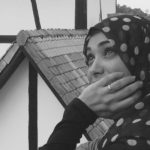 There was a woman who went mad.
There was a woman who went mad.
A girl is considered lucky here in Mukalla for two things. Firstly, when she gets married. Secondly, if her husband is working in Saudi Arabia (and whether he takes her with him or not). He will be still considered able to provide his young wife a decent life.
The wedding was spectacular. He brought her a wedding dress so beautiful that the whole town came to see it. The dress was from a silky material that was green. The colour was a sign of the fertility of the bride. The gold he brought her for the wedding had to be made especially small to fit her thin, tiny hands. On her henna day, she wore her green henna dress, all ornamented with gold strings. The Muhania said she was going to put the most recent styles of henna tattoos on her hands and feet, and that her husband would be thrilled. She also said that she had a special mixture to put in the henna to make its color reddish and beautiful.
All the family gathered for her henna day at the family home. All of the walls were decorated with colors and lights.
Neighbors brought many kinds of food and sweets for the occasion. The bride was pampered while henna dried on her hands and feet. Her mother would place the sweets in her mouth. Her aunt would draw the hair off the bride’s face and fix the green henna shawl on her head. The bride had to cover her face with a green scarf too; she would only show her face on the wedding night for the first time as a married woman. That was the tradition.
In the evening, the women started to remove the dried pieces of henna off her hands and feet, but she started screaming in pain. There was a fine line of pimples along the henna designs on her hands and feet. They were very red and painful. The small reddish spots shaped curly and flowery designs on her hands and arms. They had to rush her to the hospital. The doctor said she must have had an allergic reaction to one of the chemicals mixed with the henna. He gave her an injection for that, but all women in the family, the neighborhood, and the town were whispering that she had received aien, an evil-eye curse, because of her beauty and grace.
After the wedding, the husband took her to Saudi Arabia. She saw the house; it was small and simple, but she was happy because it was hers. He used to leave home every day to go to work. He would lock her inside. She was not allowed to go out. She was not a legal resident of Saudi Arabia. He brought her in the pilgrimage season, and then kept her hidden in the house. No one should visit her, because if anyone reported her, she would have to leave the country.
She stayed there day and night, night and day, until a sort of familiarity grew between her and the cold walls, the same walls that intimidated her. She kept herself busy with cleaning house or preparing food, but the tasks would be completed too quickly. There was only the two of them in this small house, not much to do. She would spend some days trying on her beautiful dresses that her family bought her for the wedding to be worn after the wedding as a new bride, but she never got the chance to wear them.
With no parties to attend or no visitors to dress for, she would at times try on her wedding dress. It was long and beautiful and always made her look like a queen. However, she did not dare to try on the green henna dress. She did not like the dress. This is what she would say. She never got the chance to wear her beautiful expensive jewelry after the wedding; they were locked in a box, like her, locked in a small house, alone.
Every evening when he came home, he would spend some time with her, and then eat his dinner. He would then sleep early, as he had to go to work early the next morning. In the morning, he would leave for work and lock the door.
Every day, the sound of the heavy lock started to sound increasingly louder. Her eyes would grow wider and wider every time she heard the clanging sound of the lock.
With eyes wider and colder than they had ever been, she said, “I had some pain. I tried to drink something hot and sleep, but I could not. The pain was getting worse and I did not know what to do. I was standing by the window, hoping that you will come. I listened through the door in case I might hear your footsteps”.
She continued, “Sometimes, I sat down to lessen the pain. Sometimes I stand up thinking that might help. Then I decided maybe lying down is the best thing to do. Still the pain was attacking me and I was rolling from one side to the other like a snake. I prayed some verses from Koran, but I read them all wrong. The pain was unbearable. Then suddenly, two strangers appeared in my room. Without uttering one word they helped me deliver the baby. After that, they vanished!”
Her husband stared with fear into those deep-cold and far-away eyes.
She has been mad ever since.
When I was younger, I heard my uncle’s wife say, “When Muna was a little girl, she went with her family to the suburbs for Yetkharafoon. They stayed in one of the houses that people rent for the fall, where the trees are heavy with dates and fruits. And people have their days off enjoying the season and the warm full-moon nights. They will spend the days inside get-togethers, cooking and eating, with music and poetry circles. One noon, Muna was looking out the window, and she saw a reddish goat. It was slim and beautiful. Muna had seen this goat a number of times, but this time, she saw that the unearthly goat was turning into a man.
Ever since, Muna has been mad!”
Another distant cousin said that Muna had been alone with her uncle while her mother and aunt visited a neighbour.
People also add that the house they stayed in was near a graveyard. As Muna was looking out of the window one late morning, she saw the reddish goat and she kept screaming, “The goat! The goat!”
The story says that the reddish goat ran and entered her. Her uncle came after hearing her screaming, to find her hysterical, lashing on the ground and foaming at the mouth. This drove her mad!
Muna is practically unaware of her surroundings. She does not talk. She stands still for days in her room, which is empty of anything, except a small single bed. The off-white squared curtains in her windows never blow, because the windows are closed and locked at all times; the ceiling fan will not move the curtains either, because it is broken. She stands for hours, staring into the emptiness. In the daylight, voices can be heard from the street, voices of kids playing or people talking and lots and lots of footsteps coming and going, but these never move her or attract her attention.
In the evenings, footsteps of occasional passers-by can be heard. During those evenings, Muna’s room looks worse, with the yellow light bulb making the room look even yellower, as if the whole place is infected with a yellow fever.
Muna still stands in the middle of that room.
We would talk to her mother, and we would drink the juice they would serve to us. And all that I am able to focus on is this: What is Muna doing now? Will my mother will push me to visit her room? That awful yellow room?
Before we leave, my mother would say, “Can we greet Muna?” And her mother will say: “sure, let me talk to her first”.
This moment would terrify me.
All my fears come at once. Couldn’t we leave the house without sending her our greetings?
No, my mother looks at me and says, “There is nothing to be scared of. Poor Muna. She is as innocent as an angel. She would never hurt you.”
“Muna, here is Noor and her daughter, do you remember them? They’ve come to see how you’re doing!”
Muna is staring at the wall, in a certain corner. I am thinking, oh my God! Is she seeing something or someone we don’t? What or who is it?
I am here but I’m trying not to look into her eyes, not even her face. I am stealing glances now and then at the thin, tall body, hoping that she doesn’t realize that I’m looking at her. What if she looks at me in the eyes?
What if she swallows me with her hollow and cold eyes?
My eyes get bigger.
What! She did not! I do not remember this. Please God do not let this be true! Please do not let her tell my cousins about that.
But I’m more scared of what I think I see, which is a petite smile on Muna’s lips, which assures me this is true. It is true then, well, it is true. So what? All the stories say that she was not always crazy, and if she was then, how come my mother allowed her to babysit me? Yes, it does not make any sense; the only way that will work is that she was babysitting me when she was still sane. And the second thing is why I am so scared? She is not going to make me mad like her. Madness is not a contagious disease like the flu.
But what if I started seeing things like her or ended up standing in the middle of a room staring at invisible things or people? I always wonder what lies behind those cold eyes of hers. What she is thinking about? Is she still thinking about her little child, husband, about Saudi Arabia, about being locked up? Her son is not little anymore; his name is Abdullah. He is married now and has a job. He comes to visit his mother. I am not sure if she talks to him. I heard that her husband divorced her when he discovered she was mad. He married another woman and likely has more children.
For Muna, time has stopped. She is stuck at that moment in her life when she stood up. She refuses to sit down again. And from time to time, a faint smile will appear on her face that makes me wonder whether she is seeing something we all can’t see.

Shada Bokir was born in Aden, Yemen to a housewife and a university professor, who was also a poet and a politician. After High School, she moved to Mukalla to study in the English Department at Hadhramout University, the same coastal city where the enclosed story took place. After finishing her Bachelor degree, she started working as a university lecturer until she was awarded the Fulbright scholarship; she went to the USA to study her Master’s degree in English Literature at Appalachian State University in 2009. Besides writing in English, she enjoys writing Arabic poetry as well. Ms. Bokir was awarded a scholarship to Malaysia in 2013. She is currently doing her PhD in English Literature at the National University of Malaysia (UKM).
The remixed photo of Wadi Dawan, Hadramaut, Yemen is by Jacques Taberlet. Usage of this photo is authorized under under the Creative Commons 3.0 Attribution license. Remixed by Nin Harris.